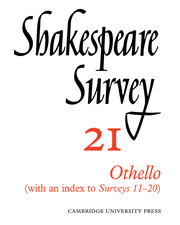Book contents
- Frontmatter
- ‘Othello’: A Retrospect, 1900–67
- The Two Parts of ‘Othello’
- ‘Othello’: A Tragedy Built on a Comic Structure
- ‘Othello’ and the Pattern of Shakespearian Tragedy
- ‘Othello’, ‘Lepanto’ and the Cyprus Wars
- Iago—Vice or Devil?
- Thomas Rymer and ‘Othello’
- Delacroix’s Tragedy of Desdemona
- Verdi’s ‘Otello’: A Shakespearian Masterpiece
- William Hervey and Shakespeare’s Sonnets
- Imagery and Irony in ‘Henry V’
- Shakespeare and the Actors: Notes towards Interpretations
- The Year's Contributions to Shakespearian Study 1 Critical Studies
- 2 Shakespeare’s Life, Times and Stage
- 3 Textual Studies
- Index to Volume 21
- General Index to Volumes 11–20
- Plate Section
‘Othello’ and the Pattern of Shakespearian Tragedy
Published online by Cambridge University Press: 28 March 2007
- Frontmatter
- ‘Othello’: A Retrospect, 1900–67
- The Two Parts of ‘Othello’
- ‘Othello’: A Tragedy Built on a Comic Structure
- ‘Othello’ and the Pattern of Shakespearian Tragedy
- ‘Othello’, ‘Lepanto’ and the Cyprus Wars
- Iago—Vice or Devil?
- Thomas Rymer and ‘Othello’
- Delacroix’s Tragedy of Desdemona
- Verdi’s ‘Otello’: A Shakespearian Masterpiece
- William Hervey and Shakespeare’s Sonnets
- Imagery and Irony in ‘Henry V’
- Shakespeare and the Actors: Notes towards Interpretations
- The Year's Contributions to Shakespearian Study 1 Critical Studies
- 2 Shakespeare’s Life, Times and Stage
- 3 Textual Studies
- Index to Volume 21
- General Index to Volumes 11–20
- Plate Section
Summary
The twelve lines that conclude Othello provide an ending that is radically different from the ending of any other of the tragedies. Lodovico’s main concern is with Iago and his punishment. There is no formal praise of the hero, the only tribute he receives being Cassio’s laconic comment on his suicide: ‘For he was great of heart.’ His body, and that of Desdemona, are not carried off in state, but hurriedly hidden from view by the drawing of the curtain around the bed on which they lie, because the spectacle they offer is felt as something monstrous and obscene. Nothing is left to be settled and disposed of except the house and fortunes of the Moor, which pass in one brief clipped sentence to Gratiano, Desdemona’s next of kin. No interpretation of the events that have led up to the disaster is given, or even promised. Faced with actions which they find shocking and unintelligible, the surviving characters seek, with a haste that is almost indecent, to put them out of sight and out of mind. Their reaction is that of the normal ordinary man, and, as such, serves to underline for the last time the remoteness of Othello from those among whom he has lived and moved. The most immediately and impressively heroic of all the tragic heroes is granted no epic valediction from the mouths of others, no ceremonious rites of funeral; primarily, of course, because he has forfeited all claim to them through his crime in murdering Desdemona, but also, I think, because he is, and always has been, a mystery and a challenge to the unheroic world in which fate and circumstance have placed him.
- Type
- Chapter
- Information
- Shakespeare Survey , pp. 39 - 46Publisher: Cambridge University PressPrint publication year: 1969



